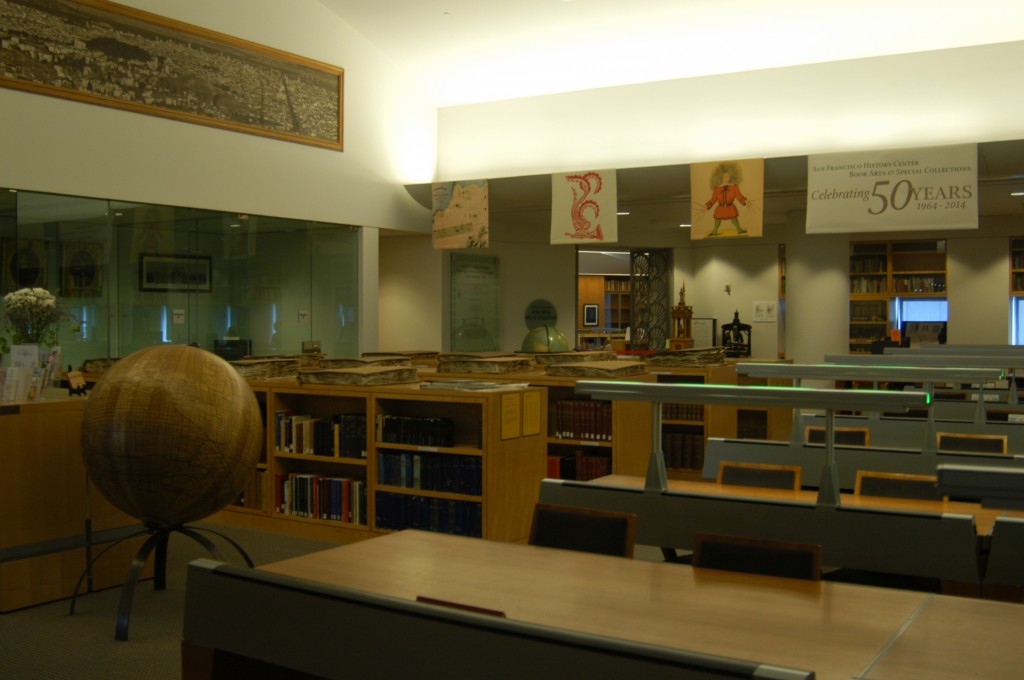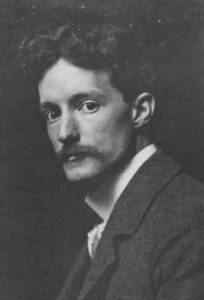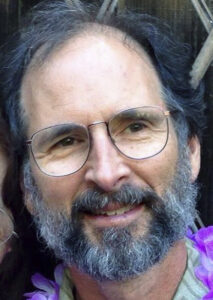
Nine Institute members received an exclusive tour of the main San Francisco Public Library on January 31, 2015. Our guide, Susan Goldstein, has served as City Archivist since 1995. In her position, she works with all the city departments to preserve and make accessible their historical records. She also manages a robust program and exhibition schedule and is currently engaged in a number of digitization projects. At the moment, she is busy preparing for the 100th anniversary celebration of the San Francisco City Hall, the U.S. Conference of Mayors, and the American Library Association Conference this coming June.
The library, designed by James Ingo Freed of Pei Cobb Freed & Partners (New York) and Cathy Simon of Simon Martin-Vegue Winkelstein Moris (San Francisco), opened its doors in 1996. Our tour included all six floors. It is immediately apparent that the “new library” has become a vital part of the city’s fabric—dynamic and responsive to the community’s needs. Under construction is a state-of-the-art digital media center for teens. Already in place is a computer training center and an extensive adult literacy program. It was noted that the library also hosts a laudable outreach program for the homeless. A wide array of rotating exhibits ensures that a visit to the library is always fresh and interesting.
In addition to the general and dedicated collections, there are special centers on African-American and Gay and Lesbian social studies. Appropriately, a large room has been set aside just for Book Arts. All three centers are beautifully appointed contemplative spaces in which to study in quiet comfort. Dig a bit deeper and you’ll find the library holds an improbable number of unique special collections. To cite just a sampling: calligraphy, wit and humor, and the 1915 Panama-Pacific International Exposition. The library also holds the photo morgue of the News-Call and over 40,000 digitized photos as part of the San Francisco Historical Photograph Collection.
The Art and Music Center on the 4th floor boasts an extensive clippings file that includes arts and entertainment programs and an etchings and engravings collection, both of which date back to the 19th century. You can check out music scores from their vast collection.
Some may be surprised to find that the library has been a federal depository since 1889. The library’s Government Information Center is your one-stop-shop for almost anything related to city, state and federal government. Particularly impressive are city police records dating back to the 1860s and mayoral records to the Mexican period.
The periodicals and newspapers collection (the Magazines and Newspapers Center) rivals or surpasses that of any Bay Area university.
Our tour culminated with a visit to the San Francisco History Center and the Book Arts Room on the 6th floor. Whether you are working on city or county history, architecture, labor, landmarks education or vital statistics, you’re bound to find something of value in the 30,000 plus volumes or audio collection held by the center. The center still makes good use of its subject and biography card catalog and ephemera guides. All materials must be used in-place and cannot be checked out. You can learn a great deal about other available resources just from a visit to the History Center. For example, if you are into maps, there is the David Rumsey Map Collection.
From a historian’s perspective, there are two points worth emphasizing. (1) A conversation with the library staff is worth its weight in gold. There is a treasure trove of primary materials tucked away in the stacks, some of it uncatalogued within layers of larger collections, that the library staff know intimately well. (2) The library is growing its digital holdings in leaps and bounds and much of it is accessible from home. On the library website, by selecting the “eLibrary” tab at the top of the page you can search access “Articles and Databases” from home, IF you hold a library card. (Any California resident with identification can get a library card for free at the Main Library or any branch.) Through the “Articles and Databases” search, for example, you can search or browse Proquest’s historical copies of the Francisco Chronicle from 1869 through 1922. The library plans to add access to the remaining years (1923 to the present) later this year.
Goldstein would love to grow the library’s collections, but storage is a practical limitation. Even if items are digitized the originals are generally retained. There is a downside to items that are “born digitized,” says Goldstein, because author notes, which are key to a full understanding of the developmental process, are generally absent. Migrating to new formats is no less challenging.
After an informative and inspiring morning at the library, the participants gathered at the Café Asia in the Asian Art Museum for an opportunity to share their thoughts and get reacquainted.
— Neil Dukas




